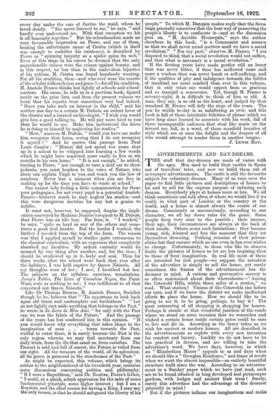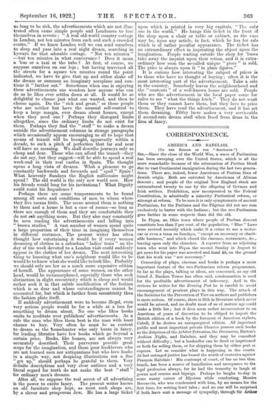ADVERTISEMENTS AND DAY-DREAMS. T HE stuff that day-dreams are made of
varies with the ages. Men used to build their castles in Spain out of travellers' tales, and now we build them out of newspaper advertisements. The castle is still the favourite subject for voluntary dreams. Many of us turn over the paper to find little pictures and descriptions of houses to let and to sell for the express purpose of inducing such dreams. Everybody plays at houses more or less. We all think sometimes and talk often of where we would live if we could, in what part of London or the country or the world, and a house is almost always the centre of our dream. Consciously or unconsciously, according to our character, we all lay down rules for the game. Some people keep very near to the possible ; their income, their age, their circumstances are always at the back of their minds. Others scorn such limitations ; they become young, rich, leisured and free the moment that they set themselves dreaming. Nothing remains of their person- alities but that essence which no one even in fun ever wishes to change. Unfortunately, to those who like to observe limits the pictures of houses to let are less inspiring than to those of freer imagination. In real life most of them are intended for rich people—we suppose the intention of the advertiser is simply to sell the house, yet surely sometimes the framer of the advertisement has the dreamer in mind. A curious and provocative secrecy is so often maintained about their whereabouts—" Among the Cotswold Hills, within three miles of a station," we read. What station? Visions of the Cotswolds rise before our eyes, and if we know the district we make ineffectual efforts to place the house. How we should like to be going to see it, to be going, perhaps, to buy it ! The most entrancing of all shopping is shopping for houses. Perhaps it stands at that wonderful junction of the roads where we stood on some occasion that we remember and wished a certain house inside certain gates could be ours to live and die in. According as the fancy takes us we wish for ancient or modern houses. All are described in the advertisements as replete with every new invention for comfort and luxury. Luckily we do not have to be too practical in dreams, and are willing to take the advertiser's word. We have days, however, in which an " 'Elizabethan Manor " appeals to us and days when we should like a " Georgian Residence," and times of revolt when we want the almost impossible—an entirely beautiful structure built since the war. According to an advertise- ment in a Sunday paper which we have just read, such are to be found situated in long developed and picturesque gardens, with hedges and ancient fruit trees 1 Surely, surely this advertiser had the advantage of the dreamer primarily in mind ! But if the pictures inflame our imaginations and maka us long to be rich, the advertisements which are not illus- trated often cause simple people and Londoners to lose• themselves in reverie : " A real old-world country cottage in London, not ten minutes from such and such a crowded centre." If we know London well we can send ourselves to sleep and pass into a real night dream, searching in byways for that adorable cottage. " Not ten minutes " —but ten minutes in what conveyance ? Does it mean a 'bus or a taxi or the tube ? At first, of course, we suppose ourselves on our legs ; but having traversed all the streets for a square ten minutes round the point indicated, we have to give that up and either shake off the dream or summon an imaginary aeroplane and con- tinue it " further out." Sometimes when one is enjoying these advertisements one wonders how anyone who can do as he likes ever settles down at all. It would be so delightful to choose just what one wanted, and then to choose again. Do the " rich and great," or those people who are neither but have the unusual self-control to keep a large margin, ever dream about houses, except when they need one ? Perhaps they disregard limits altogether, since the ordinary limits do not exist for them. Perhaps they find the stuff " to make a dream outside the advertisement columns in strange paragraphs which occasionally appear encouraging us all to hope that means of transit will be brought, apparently within a decade, to such a pitch of perfection that far and near will have no meaning. We shall describe journeys only as cheap and dear. Those who can afford the transit—they do not say, but they suggest—will be able to spend a real week-end in their real castles in Spain. The thought opens a long vista of dreams. What a pleasure to go constantly backwards and forwards and " spoil " Spain ! What heavenly Sundays the English millionaire might spend ! The old world is the only new world now. How his friends would long for his invitations ! What Dignity could resist his Impudence ? • Perhaps there are some temperaments to be found. among all sorts and conditions of men to whom where they live means little. The scene around them is nothing to them and a house is but a case of rooms—so long as there are enough of them and they are comfortable they do not ask anything more. But they also may constantly be seen reading the advertisements and falling into " brown studies." A vast number of women spend quite a large proportion of their time in imagining themselves in different costumes. The present writer has often thought how entertaining it would be if every woman dreaming of clothes in a suburban " ladies' train ' on the day of the week devoted to a London visit could suddenly appear in the clothes of her dream. The next interesting thing to knowing what one's neighbour would like to be would be to know what she would like to look like. Probably we should only see her as a much more expensive edition of herself. The appearance of some women, on the other hand, would be metamorphosed, especially those who seek distinction in slight eccentricity which is cheap and would rather seek it in that subtle modification of the fashion which is so dear and whose outstandingness 'cannot be accounted for, but which is further from eccentricity than the fashion plate itself. If suddenly advertisement were to become illegal, even very serious people would be for a while at a loss for something to dream about. No one who likes books omits to meditate over publishers' advertisements. As a rule the man who likes them best is the man with least chance to buy. Very often he must be as content to dream as the liousehunter who only hunts in fancy, for lending libraries have few books which go beyond a certain price. Books, like houses, are not always very accurately described. Their purveyors provide great scope for the imagination, and those poor booklovers who are not learned men nor antiquarians but who love books in a simple way, not despising illustrations nor a fine " get up," should perhaps be grateful to them. Very definite descriptions and very clear outlines and a very literal regard for truth do not make the best " stuff for ordinary men's dreams. After all, we suppose the real secret of all advertising is the power to excite fancy. The present writer knows an old furniture shop kept, as most such shops are, by a clever and prosperous Jew. He has a large ticket upon which is printed in very big capitals, " The only one in the world." He hangs this ticket in the front of the shop upon a chair or table or cabinet, as the case may be, upon any article, in fact, which he has for sale which is of rather peculiar appearance. The ticket has an extraordinary effect in imprinting the object upon the imagination. People waiting outside the shop for 'buses take away the imprint upon their retina, and it is extra- ordinary how soon the so-called unique " piece " is sold. The price is always upon it " in plain figures."
It is curious how interesting the subject of prices is to those who have no thought of buying ; often it is the most interesting part of the advertisement. Take a sale in the country. Somebody leaves the neighbourhood and the " contents " of a well-known house are sold. People who see the advertisement in the local paper come for miles to see " what the things fetch." They do not want them or they cannot have them, but they love to price them. They have read the advertisement, and it has set them dreaming. Filthy lucre makes a very serviceable if second-rate dream stuff when freed from dross in the fires of fancy.



































 Previous page
Previous page